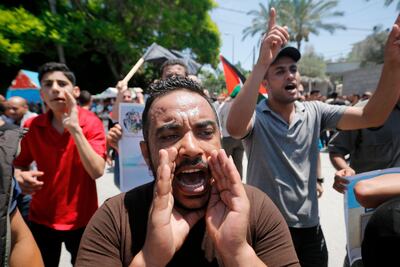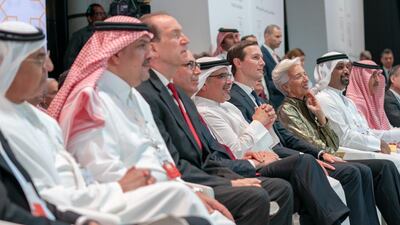The Four Seasons hotel in Manama's Bahrain Bay is protected by speedboats bristling with machine-guns, and armoured cars in the streets. Inside, an eclectic mix of people from politics, film, business and sport has gathered to hear more about the economic portion of the US peace plan for the Palestinian-Israeli conflict.
Outside the organised panels, which are half-empty when a big name is not speaking, the lobby is where most of the action is, if you can call it that. Chatter about the US plan, business talk and networking opportunities between the people this event has attracted take place over unappetising canapes and dreary piano music. Nobody would dispute that it was as exciting as a Steven Mnuchin economic report. Although, as Palestinian Prime Minister Mohammed Shtayyeh predicted, the coffee is good.
It is also unclear who compiled the invitations list (Jason Greenblatt and his team could not say), but it has brought together an odd mix of delegates for a workshop tasked with solving Palestinian-Israeli peace: real estate developers, billionaire entrepreneurs, teenage influencers from the Arab world, even a film producer.
Alongside them are White House aides running around after their subjects, Bahraini organisers trying to keep everything under control, and earpiece-laden American and Arab security details on watch.
On one side of the room, a representative of a vertical farming start-up pitches his idea to an uninterested journalist. On the other, a 15-year-old Emirati speaks of how he received a personal invitation from the US Treasury.

Amid all this, the biggest names here swan through the lobby as delegates gawp. Brian Hook, the US special representative to Iran, shakes every hand within reach. He is here to show his face at a time of high regional tension. International Monetary Fund chief Christine Lagarde moves through the lobby with a large grin, greeting those she can remember.
Then there were the maligned, the outcasts of the conflict. A Palestinian delegation of about 20 businessmen huddled together on the lobby’s sofas, keeping to themselves. At the centre is Ashraf Jabari, slouching and bored-looking in his grey suit. The other Palestinian businessmen in attendance refer to him as “Sheikh”. A member of his delegation says the sheikh is happy to give an interview as he needs more things to do.
Many Palestinians revile Mr Jabari for working with settlers in the occupied West Bank city of Hebron and for receiving support from the US ambassador to Israel, David Friedman, who is a donor to projects in the settlements, which are illegal under international law. Of 4.8 million Palestinians in Gaza and the West Bank, Mr Jabari is one of few willing to attend the conference – a token figurehead the Trump administration can wheel out in support of its policies.
The organiser of the event, wealthy Moroccan PR mogul Richard Attias, introduces VIP guests to one another to ensure the level of schmoozing is high. Israeli journalists, rabbis and businessmen wearing skullcaps mingle with Arab delegates in robes, a rare sight in the region.
Israeli journalists were allowed into the room for Jared Kushner's address on Tuesday night. Other journalists were confined to a media centre, where the internet cut out minutes into the address.
Nik Gowing, a well-spoken British presenter, moderates the workshop. His talents are used to direct panellists away from mentions of the Israeli occupation, ensuring they stick to discussing the economic potential of the occupied West Bank and the Gaza Strip without touching on politics.
The headline event was former UK prime minister and Middle East Quartet Envoy Tony Blair in conversation with Mr Kushner. Mr Blair told the Palestinians that they must engage and be an "active agent of change", regardless of the circumstances. In a gushing 15-minute discussion, Mr Kushner thanked Mr Blair for his efforts "to make the world a better place".
President Trump’s son-in-law ended his day with a media blitz, holding an off-camera gaggle, selling a message of optimism, before heading to the hotel balcony to go live on US television in time for the prime-time slots.
With that, the economic workshop ended.
Without any pledges and neither protagonist in attendance, this surreal event did little to change the dynamics of the Palestinian-Israeli conflict. What it did do was bring a disparate group of people together in the name of peace and prosperity for a Palestinian people desperately in need of both. Whether everyone in attendance was here for the Palestinians and improvement of their lives is another question.

